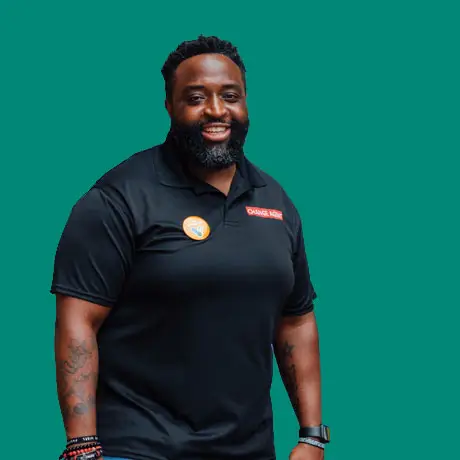With a heart for community and an infectious energy, Change Agent Phillip Cooper has taken his tumultuous past and channeled it to create positive change for those facing some of the same life experiences that he has faced.
Formerly incarcerated, Cooper has first-hand experience of what it means to be in prison and have to start a new life upon release. With the help of family members, he was able to launch a successful re-entry into society, but he says that many people don’t have a similar network to assist them. And that’s where he focuses his efforts, on the physical, mental and behavioral aspects needed for people, especially in the Black community, re-entering society. He provides those needing help with immediate assistance and connection to a network of available resources.
Currently in process of creating a 501 (c)(3) called “Operation Gateway,” which will primarily assist the formerly incarcerated with mental illness and Substance Use Disorder (SUD), Cooper has been busy networking, connecting the Black community to funding agents and creating a path for change. By partnering with the group Just Economics and Dogwood’s Racial Equity Grant, he was able to offer greatly-needed financial resources to prisoners re-entering society. The program provided cell phones for job searches, sober transportation to recovery meetings and appointments, access to culturally aligned counseling, rental assistance for sober living and funds towards obtaining vital records, including driver’s license restoration.
Cooper also worked with the Tzedek Fellowship to create a program called Clinicians of Color Movement (CCM) for people in the Black community working in or preparing to work in the mental health field. He had worked as a peer counselor for a recovery program while he was in prison. When he got out, he became a certified peer support specialist. It was during this work that he noticed the lack of diversity in providers of mental health services. His work with Clinicians of Color drew the attention of leadership at NC DHHS who wanted to know more about what Cooper was doing and how to destigmatize mental health services for the Black community in Western North Carolina and the state at large.
From there, Cooper created an event called “Voices of Affrilachia,” featuring listening sessions and site visits between NC DHHS officials and BIPOC community leaders in WNC to create culturally sensitive mental health and SUD services in WNC. Cooper has partnered with the United Way of Rutherford County and Dogwood on this “Voices of Affrilachia” project. As a direct result of the “Voices of Affrilachia” project, United Way of Rutherford County and Cooper partnered on a larger, short-term project funded by NC DHHS in collaboration with Partners Behavioral Health. The program, named “Project Urgent Need,” served people with severe mental illness or co-occurring disorders. During August and September, Cooper led a team of peer support specialists. In that short time frame, they provided housing assistance and follow-up peer support to 170 people in Western North Carolina, Catawba and Cleveland Counties. Other team members distributed Narcan across a seven-county footprint. To date, project leaders have been notified of six lives saved from overdoses thanks to this program.
In addition, Cooper has also recently taken on leadership of the WNC Recovery to Career program at Land of Sky Regional Council. This program is part of the Appalachian Regional Commission’s INvestments Supporting Partnerships In Recovery Ecosystems (INSPIRE) Initiative and is supported with Dogwood matching funds. The program deploys Certified Peer Support Specialists like Cooper to help connect workers affected by substance use disorder with supportive services and training so that they can prepare for, secure and retain employment.
As a networker, Cooper has worked with many outstanding organizations in WNC seeking the betterment of the community, but of his work with Dogwood he says, “It has been graceful and genuine. I think Dogwood was needing a person like me, and I was needing a foundation like Dogwood. I came with lived experience and knowledge of gaps in services and relationships in the community. They were genuinely looking for people like me to provide experience, strength and hope.”


